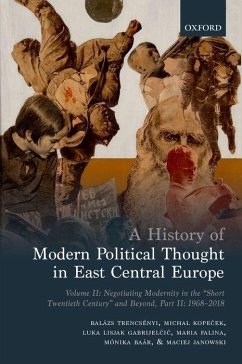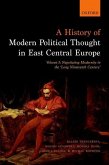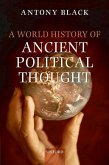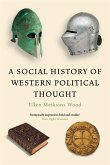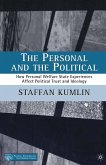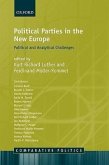Balazs Trencsenyi, Kope &, Lisjak Gabrijel &, Maria Falina, Monika Baar
A History of Modern Political Thought in East Central Europe
Volume II: Negotiating Modernity in the 'Short Twentieth Century' and Beyond, Part II: 1968-2018
Balazs Trencsenyi, Kope &, Lisjak Gabrijel &, Maria Falina, Monika Baar
A History of Modern Political Thought in East Central Europe
Volume II: Negotiating Modernity in the 'Short Twentieth Century' and Beyond, Part II: 1968-2018
- Gebundenes Buch
- Merkliste
- Auf die Merkliste
- Bewerten Bewerten
- Teilen
- Produkt teilen
- Produkterinnerung
- Produkterinnerung
A History of Modern Political Thought in East Central Europe, Volume II Part II examines the defeat of the vision of 'socialism with a human face' in 1968 and the political discourses produced by the various 'consolidation' or 'normalization' regimes. It closes with pertinent questions about the fragility of the democratic order globally.
Andere Kunden interessierten sich auch für
![A History of Modern Political Thought in East Central Europe A History of Modern Political Thought in East Central Europe]() Balazs TrencsenyiA History of Modern Political Thought in East Central Europe177,99 €
Balazs TrencsenyiA History of Modern Political Thought in East Central Europe177,99 €![A World History of Ancient Political Thought A World History of Ancient Political Thought]() Antony BlackA World History of Ancient Political Thought113,99 €
Antony BlackA World History of Ancient Political Thought113,99 €![A Social History of Western Political Thought A Social History of Western Political Thought]() Ellen Meiksins WoodA Social History of Western Political Thought34,99 €
Ellen Meiksins WoodA Social History of Western Political Thought34,99 €![The Personal and the Political The Personal and the Political]() S. KumlinThe Personal and the Political38,99 €
S. KumlinThe Personal and the Political38,99 €![Explorations in African Political Thought Explorations in African Political Thought]() Explorations in African Political Thought198,99 €
Explorations in African Political Thought198,99 €![Political Parties in the New Europe Political Parties in the New Europe]() Kurt Richard Luther / Ferdinand Müller-Rommel (eds.)Political Parties in the New Europe332,99 €
Kurt Richard Luther / Ferdinand Müller-Rommel (eds.)Political Parties in the New Europe332,99 €![Soldiers of Democracy? Soldiers of Democracy?]() Sharan GrewalSoldiers of Democracy?127,99 €
Sharan GrewalSoldiers of Democracy?127,99 €-
-
-
A History of Modern Political Thought in East Central Europe, Volume II Part II examines the defeat of the vision of 'socialism with a human face' in 1968 and the political discourses produced by the various 'consolidation' or 'normalization' regimes. It closes with pertinent questions about the fragility of the democratic order globally.
Hinweis: Dieser Artikel kann nur an eine deutsche Lieferadresse ausgeliefert werden.
Hinweis: Dieser Artikel kann nur an eine deutsche Lieferadresse ausgeliefert werden.
Produktdetails
- Produktdetails
- Verlag: Hurst & Co.
- Seitenzahl: 402
- Erscheinungstermin: 18. Dezember 2018
- Englisch
- Abmessung: 236mm x 157mm x 30mm
- Gewicht: 748g
- ISBN-13: 9780198829607
- ISBN-10: 0198829604
- Artikelnr.: 54385419
- Herstellerkennzeichnung
- Libri GmbH
- Europaallee 1
- 36244 Bad Hersfeld
- gpsr@libri.de
- Verlag: Hurst & Co.
- Seitenzahl: 402
- Erscheinungstermin: 18. Dezember 2018
- Englisch
- Abmessung: 236mm x 157mm x 30mm
- Gewicht: 748g
- ISBN-13: 9780198829607
- ISBN-10: 0198829604
- Artikelnr.: 54385419
- Herstellerkennzeichnung
- Libri GmbH
- Europaallee 1
- 36244 Bad Hersfeld
- gpsr@libri.de
Balázs Trencsényi is Professor in the Department of History, Central European University Budapest. His research focuses on the comparative history of political thought in East Central Europe and the history of historiography. He is Co-Director of Pasts, Inc., Center for Historical Studies at CEU and Editor of the periodical East Central Europe (Brill). His publications include A History of Modern Political Thought in East Central Europe: Volume I: Negotiating Modernity in the 'Long Nineteenth Century' (with Maciej Janowski, Monika Baar, Maria Falina, and Michal Kope¿ek, OUP, 2016), The Politics of 'National Character': A Study in Interwar East European Thought (Routledge, 2012), Whose Love of Which Country?: Composite States, National Histories and Patriotic Discourses in Early Modern East Central Europe (Brill, 2010), and Hungary and Romania beyond National Narratives: Comparisons and Entanglements (Peter Lang, 2013). Michal Kope¿ek is Head of the Ideas and Concepts Department at the Institute of Contemporary History in Prague, and Co-Director of Imre Kertész Kolleg, Friedrich Schiller University in Jena. His publications include A History of Modern Political Thought in East Central Europe: Volume I: Negotiating Modernity in the 'Long Nineteenth Century' (with Balázs Trencsényi, Maciej Janowski, Monika Baar, Maria Falina, OUP, 2016), and Quest for the Revolution's Lost Meaning: Origins of the Marxist Revisionism in Central Europe, 1953-1960 (forthcoming Brill, 2018). Luka Lisjak Gabrijel¿i¿ is a PhD candidate at the program in Comparative History of Central, Southeastern and Eastern Europe at the Central European University, Budapest. His main fields of interest include intellectual history, nationalism, and history of political thought, with a focus on European peripheries and semi-peripheries. He co-authored a volume on modern radical ideologies ( Utopije demokracije, ZNK Masovna, 2005), and edited a volume on humanism in contemporary social and political thought ( Blodnjaki smisla: misliti humanizem danes, DHG, 2007). He is the editor of the Slovenian quarterly journal Razpotja. Maria Falina is Lecturer in Modern European History at Dublin City University. Her main fields of interest are intellectual history, nationalism, and history of religion and politics. Her publications include A History of Modern Political Thought in East Central Europe: Volume I: Negotiating Modernity in the 'Long Nineteenth Century' (with Balázs Trencsényi, Michal Kope¿ek, Maciej Janowski, and Monika Baar, OUP, 2016), and articles such as 'Between "Clerical Fascism" and Political Orthodoxy: Orthodox Christianity and Nationalism in Interwar Serbia' in Totalitarian Movements & Political Religions (2007) and 'Religion Visible and Invisible: The Case of Post-Yugoslav Anti-War Films', in C. Schmitt and L. Berezhnaya, eds. Iconic Turn(s): Religion and Nation in East European Films after 1989 (Brill, 2013). Mónika Baár is Professor of Central European Studies at the University of Leiden. Her research focuses on modern historiography, cultural history and political thought, with special attention to the problem of marginality. Her publications include A History of Modern Political Thought in East Central Europe: Volume I: Negotiating Modernity in the 'Long Nineteenth Century' (with Balázs Trencsényi, Michal Kope¿ek, Maciej Janowski, and Maria Falina, OUP, 2016), and Historians and the Nationalism: East-Central Europe in the Nineteenth Century (OUP, 2010). She is Associate Editor of Nationalities Papers. Maciej Janowski is Head of Section at the Institute of History, Polish Academy of Sciences, Warsaw and Visiting Professor at the Central European University, Budapest. His main fields of interest are social and intellectual history of Central Europe and the history of liberalism. He is editor of the periodical East Central Europe (Brill) and Deputy Editor of Kwartalnik Historyczny. His publications include A History of Modern Political Thought in East Central Europe: Volume I: Negotiating Modernity in the 'Long Nineteenth Century' (with Balázs Trencsényi, Michal Kope¿ek, Mónika Baár, and Maria Falina, OUP, 2016), and Polish Liberal Thought before 1918 (CEU Press, 2004).
* Authors' Note
* 11: Late State Socialism: Consolidation, Legitimization, and Reform
from Above
* 11.1: The raison d'état of 'really existing socialism'
* 11.2: National communism: Liberalization or neo-Stalinism?
* 11.3: The dilemmas of perestroika reformism
* 12: Political Thought in Exile
* 12.1: Ideological, generational, and institutional cleavages
* 12.2: The intellectual battle with communism
* 13: Dissidents and Opposition Movements
* 13.1: The emergence of dissident discourses and subcultures
* 13.2: Dialogue and empowerment
* 13.3: The identity politics of the dissidents
* 13.4: Toward a self-limiting revolution
* PART III: Farewell to Modernity? Thinking Politics After the' End of
History'
* 14: Velvet Revolutions and the Thorny Paths of Transition
* 14.1: Visions of democratic transformation
* 14.2: The ambiguities of the 'liberal consensus'
* 14.3: Coming to terms with the past
* 14.4: Church, religion, and democracy
* 15: 'Rebuilding the Boat on the Open Sea'
* 15.1: The dilemmas of state-building and constitutional reforms
* 15.2: The specter of ethnopopulism
* 15.3: Modes of coexistence
* 16: In Search of a New Ideology
* 16.1: The 'culture wars' of the 2000s
* 16.2: Radicalizing democracy
* 16.3: Centers and peripheries
* 11: Late State Socialism: Consolidation, Legitimization, and Reform
from Above
* 11.1: The raison d'état of 'really existing socialism'
* 11.2: National communism: Liberalization or neo-Stalinism?
* 11.3: The dilemmas of perestroika reformism
* 12: Political Thought in Exile
* 12.1: Ideological, generational, and institutional cleavages
* 12.2: The intellectual battle with communism
* 13: Dissidents and Opposition Movements
* 13.1: The emergence of dissident discourses and subcultures
* 13.2: Dialogue and empowerment
* 13.3: The identity politics of the dissidents
* 13.4: Toward a self-limiting revolution
* PART III: Farewell to Modernity? Thinking Politics After the' End of
History'
* 14: Velvet Revolutions and the Thorny Paths of Transition
* 14.1: Visions of democratic transformation
* 14.2: The ambiguities of the 'liberal consensus'
* 14.3: Coming to terms with the past
* 14.4: Church, religion, and democracy
* 15: 'Rebuilding the Boat on the Open Sea'
* 15.1: The dilemmas of state-building and constitutional reforms
* 15.2: The specter of ethnopopulism
* 15.3: Modes of coexistence
* 16: In Search of a New Ideology
* 16.1: The 'culture wars' of the 2000s
* 16.2: Radicalizing democracy
* 16.3: Centers and peripheries
* Authors' Note
* 11: Late State Socialism: Consolidation, Legitimization, and Reform
from Above
* 11.1: The raison d'état of 'really existing socialism'
* 11.2: National communism: Liberalization or neo-Stalinism?
* 11.3: The dilemmas of perestroika reformism
* 12: Political Thought in Exile
* 12.1: Ideological, generational, and institutional cleavages
* 12.2: The intellectual battle with communism
* 13: Dissidents and Opposition Movements
* 13.1: The emergence of dissident discourses and subcultures
* 13.2: Dialogue and empowerment
* 13.3: The identity politics of the dissidents
* 13.4: Toward a self-limiting revolution
* PART III: Farewell to Modernity? Thinking Politics After the' End of
History'
* 14: Velvet Revolutions and the Thorny Paths of Transition
* 14.1: Visions of democratic transformation
* 14.2: The ambiguities of the 'liberal consensus'
* 14.3: Coming to terms with the past
* 14.4: Church, religion, and democracy
* 15: 'Rebuilding the Boat on the Open Sea'
* 15.1: The dilemmas of state-building and constitutional reforms
* 15.2: The specter of ethnopopulism
* 15.3: Modes of coexistence
* 16: In Search of a New Ideology
* 16.1: The 'culture wars' of the 2000s
* 16.2: Radicalizing democracy
* 16.3: Centers and peripheries
* 11: Late State Socialism: Consolidation, Legitimization, and Reform
from Above
* 11.1: The raison d'état of 'really existing socialism'
* 11.2: National communism: Liberalization or neo-Stalinism?
* 11.3: The dilemmas of perestroika reformism
* 12: Political Thought in Exile
* 12.1: Ideological, generational, and institutional cleavages
* 12.2: The intellectual battle with communism
* 13: Dissidents and Opposition Movements
* 13.1: The emergence of dissident discourses and subcultures
* 13.2: Dialogue and empowerment
* 13.3: The identity politics of the dissidents
* 13.4: Toward a self-limiting revolution
* PART III: Farewell to Modernity? Thinking Politics After the' End of
History'
* 14: Velvet Revolutions and the Thorny Paths of Transition
* 14.1: Visions of democratic transformation
* 14.2: The ambiguities of the 'liberal consensus'
* 14.3: Coming to terms with the past
* 14.4: Church, religion, and democracy
* 15: 'Rebuilding the Boat on the Open Sea'
* 15.1: The dilemmas of state-building and constitutional reforms
* 15.2: The specter of ethnopopulism
* 15.3: Modes of coexistence
* 16: In Search of a New Ideology
* 16.1: The 'culture wars' of the 2000s
* 16.2: Radicalizing democracy
* 16.3: Centers and peripheries

